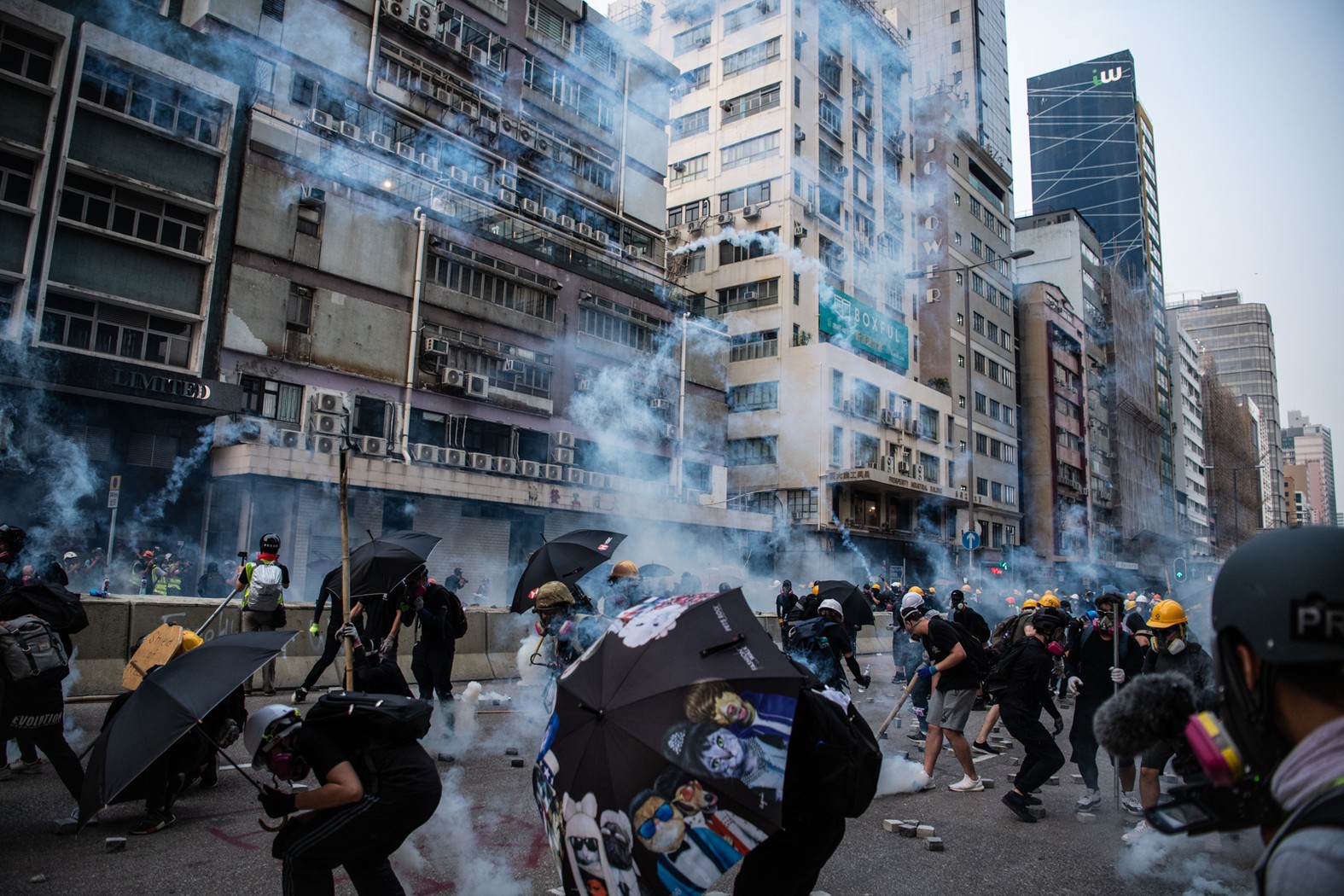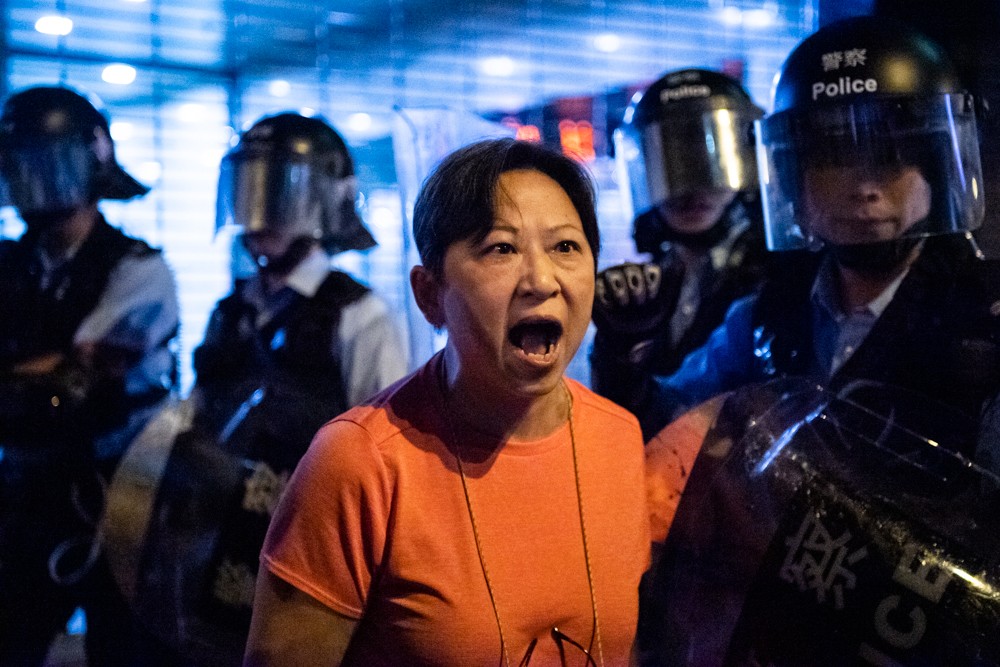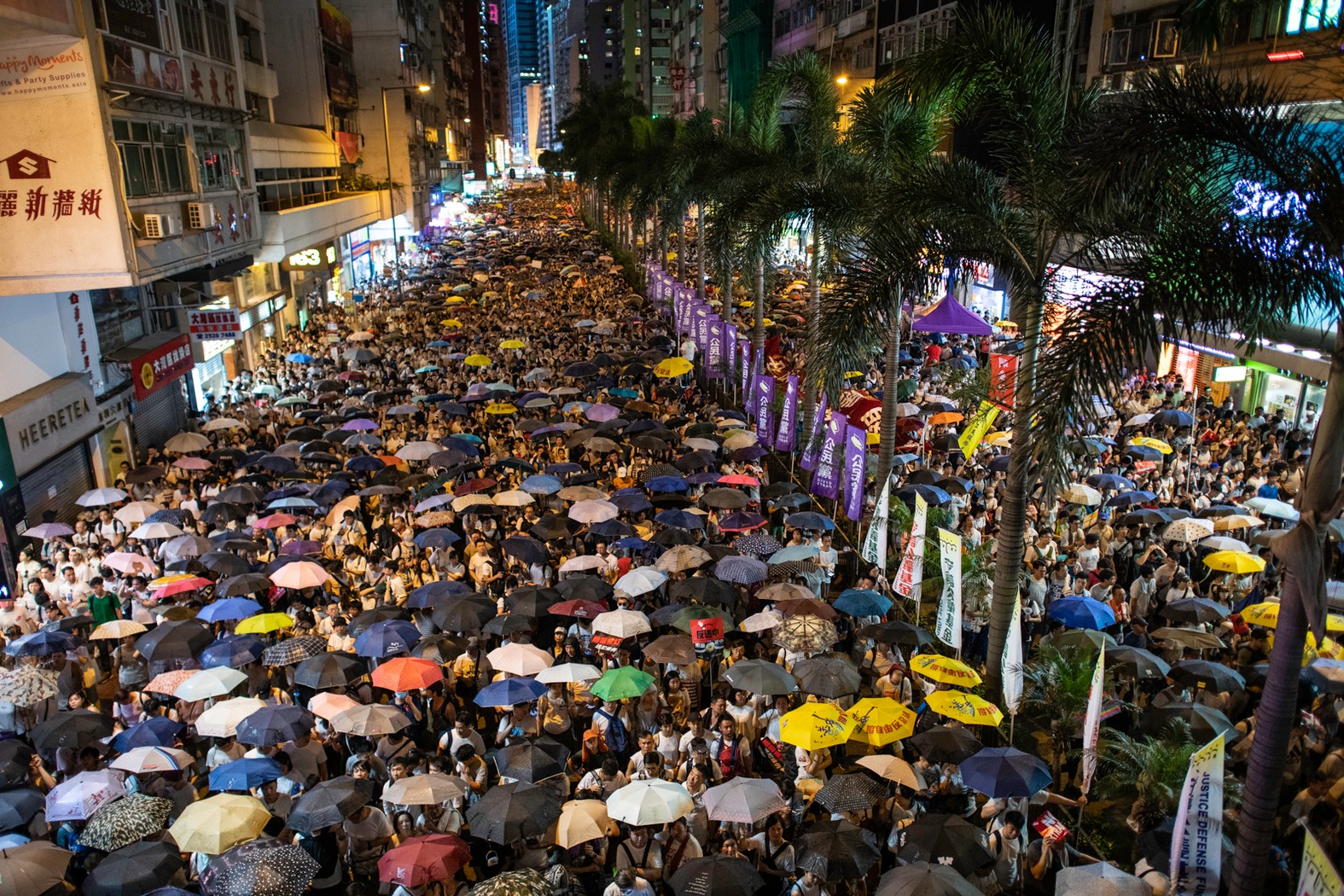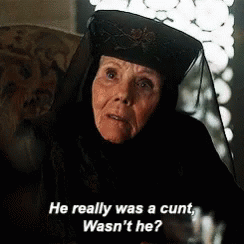I felt a little ridiculous walking with the face mask on, passing by people out walking their dogs on a bright, normal Sunday afternoon. It was only until I was in sight of other face masks and black shirts when I glanced around for hidden Chinese cameras, and quietly slipped on the face mask. In the middle of Astor Place, New York, I joined a crowd of 300 odd strangers, and started shouting slogans in Cantonese. Some of them I knew - others I pretended to know. Together we sang the new adopted Hong Kong anthem 願榮光歸香港. We all had to look up the lyrics, no one pretended to know. A bunch of speakers involved in the Hong Kong democracy movement spoke, headlined by Denise Ho, the singer turned activist banned in mainland China. She was in town for a concert the next day, and despite not knowing any of her songs, I bought a ticket right there.
Her concert took place in Town Hall, a proper venue near Bryant Park capable of seating 1500. That Monday night, roughly 600 Cantonese speakers occupied the hall. The lights dimmed, but an awkward 5 minutes elapsed without anyone taking the stage. Then, a male voice pierced the nervous chitchat - "光復香港!" (Reclaim Hong Kong!) What might have been taken as a rude heckle was instead immediately responded by several hundred "時代革命!" (Revolution of our times) Then a female voice from the other side of the balcony shouted "五大訴求!" (Five demands) and the crowd enthusiastically shouted "缺一不可!" (Not one less). I joined in earnestly, having learned all the chants the previous day. As the spontaneous cheering echoed sporadically for several minutes, and I couldn't help but beam with delight. Denise Ho finally came on stage and opened with Bob Dylan's "Blowin' in the Wind." There were several more 光復香港 calls throughout the night. When a guest Taiwanese pianist gave a speech of solidarity and then launched into 願榮光歸香港 on the keys, everyone immediately stood up and started singing. Here in this Hong Kong bubble on 43rd and 6th was this passionate, collective political energy in the air that I had never felt before - and I was at Obama's 2009 Inauguration.
*****
This is probably the hardest post I've ever written. As someone with strong ties to Hong Kong, the United States, and mainland China, the protests in Hong Kong have pulled me in a number of directions. However, I've been trepidatious about expressing my feelings for several reasons. Firstly, I'm aware that this is not my fight - I haven't lived in Hong Kong in nearly 4 years, and I carry an American passport. I'm not on the ground, dealing with the tear gas and the train delays. Though I've grown my Chinese vocabulary to include 林鄭下台,被捕,黑警察,騷亂,光復, 示威,變質,暴徒 and 屌你老尾大台, I still struggle to read the Chinese news which is often cycles ahead of the English news. Ultimately, though I am deeply personally invested, I recognize this is not my fight.
Her concert took place in Town Hall, a proper venue near Bryant Park capable of seating 1500. That Monday night, roughly 600 Cantonese speakers occupied the hall. The lights dimmed, but an awkward 5 minutes elapsed without anyone taking the stage. Then, a male voice pierced the nervous chitchat - "光復香港!" (Reclaim Hong Kong!) What might have been taken as a rude heckle was instead immediately responded by several hundred "時代革命!" (Revolution of our times) Then a female voice from the other side of the balcony shouted "五大訴求!" (Five demands) and the crowd enthusiastically shouted "缺一不可!" (Not one less). I joined in earnestly, having learned all the chants the previous day. As the spontaneous cheering echoed sporadically for several minutes, and I couldn't help but beam with delight. Denise Ho finally came on stage and opened with Bob Dylan's "Blowin' in the Wind." There were several more 光復香港 calls throughout the night. When a guest Taiwanese pianist gave a speech of solidarity and then launched into 願榮光歸香港 on the keys, everyone immediately stood up and started singing. Here in this Hong Kong bubble on 43rd and 6th was this passionate, collective political energy in the air that I had never felt before - and I was at Obama's 2009 Inauguration.
*****
This is probably the hardest post I've ever written. As someone with strong ties to Hong Kong, the United States, and mainland China, the protests in Hong Kong have pulled me in a number of directions. However, I've been trepidatious about expressing my feelings for several reasons. Firstly, I'm aware that this is not my fight - I haven't lived in Hong Kong in nearly 4 years, and I carry an American passport. I'm not on the ground, dealing with the tear gas and the train delays. Though I've grown my Chinese vocabulary to include 林鄭下台,被捕,黑警察,騷亂,光復, 示威,變質,暴徒 and 屌你老尾大台, I still struggle to read the Chinese news which is often cycles ahead of the English news. Ultimately, though I am deeply personally invested, I recognize this is not my fight.
Secondarily, even the limited sentiments I've expressed on social media have received hatemail. Numerous mainland Chinese friends have thrown me uninformed arguments and distaste. Like many, my family is split, with aunts, uncles and parents on either side of the conflict. Even in this divided age in US politics, the vitriol surrounding Hong Kong protests had affected me to new levels. It is so much easier to just ignore it all.
Furthermore, I know that not being on the ground divorces me from the realities of the conflict. My view of these protests would likely change if they'd caused me to miss a flight. I don't intend this to be a referendum of the aims or tactics of the protesters, or the emotional clashes with the police. There's enough back and forth already out there and I don't want to get involved in that.
Lastly, scary anecdotes have convinced me that by putting this out in the web, there is a non-zero chance that I will be banned from entering China. Or thrown into a Chinese prison upon arrival. It's a very low chance, but at this day and age, non-zero. I still love China, and I very much don't want to spend the rest of my life not being able to return. I really would like to see 張家界 Zhang Jia Jie and 九寨溝 Jiu Zhai Gou.
 |
| Laurel Chor - Vice News |
It's perhaps my love for China that's made me uneasy. In years past, I've mostly been irked by anti-China coverage in Western media - nearly every New York Times article about China shades away from conveying the requisite China context, and instead leads toward painting a skewed dystopian attention-grabbing picture. Whether it is understanding how little Chinese citizens worry about privacy or how poor the country was in the 1960s, I have occasionally found myself reluctantly playing the role of China apologist. Even the South Park episode "Band in China" that came out this week (and I very much enjoyed) bristled me at first - South Park seemed to be punching down.
My time in the mainland forced me to reckon with my stereotypes and I became more sympathetic to a lot of PRC perspectives. I do believe that too many "international" institutions are just Western institutions. I see clearly the hypocrisy steeped in many Western critiques of modern PRC policies, especially those in Africa. It infuriates me when Americans shame other countries while lacking perspective of their own imperialism and genocide. Discussions I've had with mainlanders have convinced me that democracy is not some magic political panacea to societal ills. Educational dogma blinds most Americans from being introspective about this. At a time when American and British democracy are legitimately failing, it is not a good time to preach.
And I definitely believe that the PRC should be proud of the 300+ million people lifted out of poverty. The high speed rails, the QR mobile payments, the skyscrapers, the wind turbines - these are all awesome achievements. Not to mention the karaoke, the food, the millennia of history. Nowadays Beijing/Shanghai boasts a quality of life that I find comparable to New York, and I seriously considered moving there this year. In addition, I have so much respect for the hardships that nearly ever PRC citizen has endured. From the migrant workers to Shenzhen who toil in the factories to the Gaokao survivors now overeducated and underemployed, most mainlanders are tough.
The injustices carried out by the Chinese Communist Party (CCP) have hovered over us my whole life. There is a cognitive dissonance to knowingly that this same government processing your visa is simultaneously repressing Tibetans and Uyghurs, performing forced abortions, and detaining political dissidents without trial. It's the sort of dissonance that one must maintain to have to stay sane and function in modern society. I don't believe that living in or working with China need be an endorsement of CCP policies.
With all those caveats out of the way, I intend to be very critical of the CCP, with a target audience of Americans without ties to China. I want to spread awareness of the protests in Hong Kong. I want people to be aware of their fundamental makeup promoting the will of the Hong Kong people and rejecting the CCP. I'm resigning myself to enraging many people.
The part that has surprised/infuriated me most is the angry and vocal reactions of mainlanders with no connection to Hong Kong. Seemingly apolitical acquaintances have suddenly come out and expressed outrage at Hong Kongers, whether or not the protests directly affect them. In Chinatown, NY in early August, protesting Hong Kongers were surrounded and outnumbered by people wearing red and waving the red and yellow flag. I had not thought that Chinese immigrants to the US would maintain this party line. Clearly I had underestimated the endurance and diffusion of the CCP-constructed nationalism. I did not engage directly with the counter protesters then, but there are two main anti-protest points that I would like to refute here.
The first is the quickfire accusation of "foreign interference." This shot, always unaccompanied by evidence, echoes the claims of "northern agitators" made by the segregationist Southerners during the Civil Rights movement. I could accuse these accusers of being agents of the CCP with just as much evidence. It's a lazy, and frankly offensive, point to dismiss the movement as artificial and take agency away from the Hong Kong protesters. Sure, there are many reasons for Western governments to root for unrest in Hong Kong, but this movement is very much homegrown. It's clear that these young activist leaders have done their homework, reading up on Gandhi, MLK, the Baltic Way and other non-violent movements. The demonstrations on the streets of Hong Kong were not drummed up in some US consulate boardroom - they matured in City U student group meetings in the 5 years since the Umbrella Revolution, exacerbated by the actions of Carrie Lam's government. The "foreign interference" accusation is mere willful ignorance of the true extent of the divide.
The second is even more offensive: the attack that Hong Kongers have been corrupted by "Britishness." Mainlanders claim colonial rule instilled an inferiority complex in Hong Kongers, making them ashamed of their Chinese heritage. The problem with that argument is that Hong Kong is not particularly British. Hong Kongers do not sip tea like the British, do not care about cricket, do not have panel shows, and do not cook bland food. While here is not the place to unpack the skewed social dynamics created by colonialism, the most important outcome of 150 years of British rule was not to make it more British. Rather it was to insulate Hong Kong from the Communist takeover and keep it a part of the global community. While mainland China was closing borders and smashing ancient treasures, Hong Kong was both competing with Taiwan to preserve "authentic" Chinese culture as well as welcoming international influence. Alongside the British and Chinese, Jews, Parsis, Armenians - with names like Sassoon, Mody and Catchick - helped shaped the city. They remain memorialized in street names and descendants.1 In modernity, the notable influence of Indians, Nepalese, Filipinos, Indonesians, Singaporeans, Malaysians, Japanese, and Koreans amongst others distinguishes Hong Kong from any mainland city. It is the success of this international city with a Chinese backbone that most upsets the CCP, and thus they in turn try to spin this strength as a weakness.
 |
| Laurel Chor - Vice News |
This has made me realize how integral unity is to the Chinese nationalism preached by the CCP. It is an insecure nationalism, one propped up by propaganda instead of naturally inspired. The refusal of the Hong Kong Chinese people to buy into this nationalism undermines its entire existence. CCP leadership must think, "Our country is so great now! Why don't you want to be part of it?" They legitimately cannot understand how after all the high speed rail and economic growth, why Hong Kongers don't want in. Especially after so many CCP officials suffered so much in their lives to not have freedom, they feel bitter at these spoiled Hong Kongers who haven't suffered so much and don't seem to understand patriotism.
The CCP only knows two ways to instill patriotism - propaganda and force. This is a party founded by a man who said "槍桿子裡面出政權 - Political power grows out of the barrel of a gun." Winning the war of ideas, is not their modus operandi. It is one matter to get your citizens used to the cards they've been dealt, and quite another to get people to choose to give up their right to free speech. Chairman Xi and the CCP have chosen not to engage in this sort of debate. I see this Hong Kong protest not as a protest for Western systems, not as a protest against Chinese culture, not even as an expression of economic anxiety in a brutally unequal society - fundamentally this is a refute of the Chinese Communist Party and the ideals it stands for.
If the CCP really believed that Hong Kong was an inseparable part of China, then they should approach Hong Kong as partners. Instead of coming in with simplified characters and Mandarin speeches and treating the directorship of the Hong Kong and Macau Affairs office as a rotational bureaucrat role, they should allow Cantonese from Guangdong to handle affairs and emphasize the deep cultural ties. The actions of the CCP reveal their true beliefs: Hong Kong is not an inseparable part of China, Hong Kong is a subservient part of China.

Xi Jinping's CCP is not Mao's CCP or even Hu Jintao's CCP. Chairman Xi has stepped up the extreme nationalism and authoritarian oppression. Tibet and Xinjiang are not able to stand up to this CCP. Hong Kong is luckily in a better position, and should fight hardest, not just for her rights but also for the rights of Tibetans, Uyghurs and the more oppressed. Not only is it the moral approach, but it's the logical one - we are all fighting to allow for our identity in the Chinese nation. It is a fight against the CCP's iron-fisted approach at converting every citizen of the PRC into the same linguistic and cultural creature.
*****
I think I get why mainland Chinese are so worked up. In explaining Hong Kong's status to Americans, I have previously used Puerto Rico as an analogy. But a better analogy might be a situation where democrats won the presidency, and Texas tried to leave the nation. Liberals would be justifiably outraged. "Who do these Texans think they are?" Jurisprudentially, this is a terrible analogy, but it demonstrates the level of pride mainlanders have invested in this situation. "You are delusional to disagree with us. You cannot survive on your own."
****
This is an amalgamation of several conversations I've had recently in Mandarin with mainland Chinese (MC) immigrants in America, who don't think I look Chinese.
MC: 為什麼你會說普通話?Why do you speak Mandarin?
CAL: 因為我是中國人。Because I'm Chinese.
MC: 你不像中國人。 You don't look Chinese.
CAL: 可能你有道理。我是香港人。 I guess you're right. I'm a Hong Konger.
MC: 香港是中國不可分離的部分。Hong Kong is an inseparable part of China.
CAL: 所以我是中國人嗎? So I'm Chinese, right?
MC: 但是你不像中國人。But you don't look Chinese.
I think this encapsulates what's so wrong with Chinese nationalism. Humans don't fall neatly into ethnic national buckets. You can't build a society by suppressing ethnic, religious and linguistic differences. You have to embrace our humanness because that's the basis we all share. That is what the Hong Kong protests are fundamentally about. It is about a vision of the world that respects human dignity and difference.
1 Some of these descendants moved around the world and now write blogs about the Hong Kong protests.

















